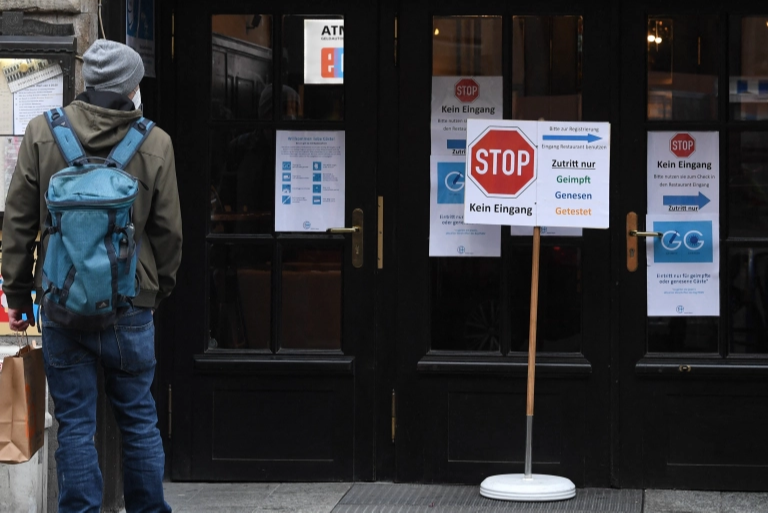
Signs on a Munich restaurant tells guests that only people who are vaccinated, tested negative or who have recovered from COVID-19 can enter [Christof Stache/AFP]
Berlin, November 25 (RHC)-- Germany has announced record coronavirus fatalities and infections as its total death toll passed 100,000, with its most severe virus wave to date breaking just as a new government prepares to take the reins.
Europe’s largest economy recorded 351 fatalities in the past 24 hours, bringing the total death toll since the start of the pandemic to 100,119, according to figures from the Robert Koch Institute (RKI), a public health agency, announced on Thursday.
The weekly incidence rate also hit an all-time high of 419.7 new infections per 100,000 people, RKI announced. Germany weathered earlier bouts of the pandemic better than many other European countries but has seen a recent resurgence, with intensive care beds rapidly filling up.
The escalating health crisis poses an immediate challenge to the new coalition government set to take over from Angela Merkel’s cabinet next month. The spike in Germany comes as Europe re-emerges as the pandemic’s epicentre, with the continent battling sluggish vaccine uptake in some nations, the highly contagious Delta variant, colder weather moving people indoors, and the easing of restrictions.
Last week, more than 2.5 million cases and nearly 30,000 COVID-related deaths were recorded in Europe, making it by far the region currently worst hit by the virus, according to a tally by AFP news agency.
In a sign of the severity of the virus wave hitting Germany, its health sector has had to call on hospitals elsewhere in the European Union for help. Some hospitals are already facing an “acute overload” that has made it necessary to transfer COVID-19 patients abroad, AFP quoted Gernot Marx, head of the German Interdisciplinary Association for Intensive Care and Emergency Medicine, as saying.
Germany last week announced tougher restrictions, including requiring people to prove they are vaccinated, have recovered from COVID-19 or have recently tested negative for the virus before they can travel on public transport or enter workplaces.
Several of the worst-hit areas have gone further, cancelling large events like Christmas markets and barring unvaccinated people from bars, gyms and leisure facilities. The spike has ignited a fierce debate about whether to follow Austria’s example and make vaccinations mandatory for all citizens.
Incoming Chancellor Olaf Scholz has voiced support for compulsory vaccinations for healthcare staff, and said that his government would “do everything necessary to bring our country safely through this time.” “The situation is serious,” said Scholz’s Social Democrats after announcing a coalition agreement with the Greens and the FDP liberals on Wednesday.
Earlier this week, outgoing Chancellor Merkel, who is retiring from politics after four terms, summoned the new centre-left-led alliance’s top brass for pandemic talks. Scholz said his new government would invest one billion euros ($1.1bn) in bonuses for healthcare workers on the front lines of the pandemic.

